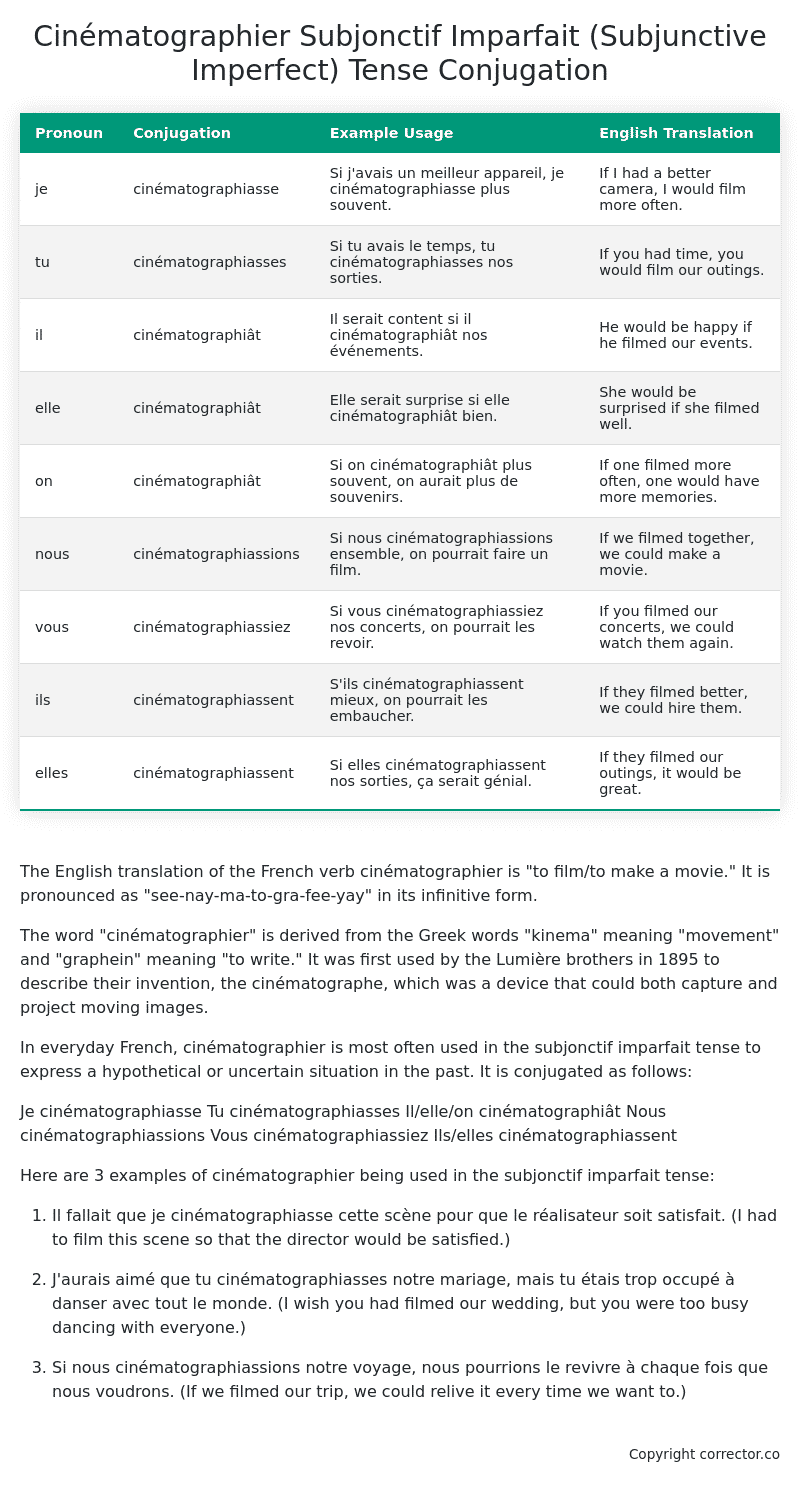Subjonctif Imparfait (Subjunctive Imperfect) Tense Conjugation of the French Verb cinématographier
Introduction to the verb cinématographier
The English translation of the French verb cinématographier is “to film/to make a movie.” It is pronounced as “see-nay-ma-to-gra-fee-yay” in its infinitive form.
The word “cinématographier” is derived from the Greek words “kinema” meaning “movement” and “graphein” meaning “to write.” It was first used by the Lumière brothers in 1895 to describe their invention, the cinématographe, which was a device that could both capture and project moving images.
In everyday French, cinématographier is most often used in the subjonctif imparfait tense to express a hypothetical or uncertain situation in the past. It is conjugated as follows:
Je cinématographiasse
Tu cinématographiasses
Il/elle/on cinématographiât
Nous cinématographiassions
Vous cinématographiassiez
Ils/elles cinématographiassent
Here are 3 examples of cinématographier being used in the subjonctif imparfait tense:
-
Il fallait que je cinématographiasse cette scène pour que le réalisateur soit satisfait. (I had to film this scene so that the director would be satisfied.)
-
J’aurais aimé que tu cinématographiasses notre mariage, mais tu étais trop occupé à danser avec tout le monde. (I wish you had filmed our wedding, but you were too busy dancing with everyone.)
-
Si nous cinématographiassions notre voyage, nous pourrions le revivre à chaque fois que nous voudrons. (If we filmed our trip, we could relive it every time we want to.)
Table of the Subjonctif Imparfait (Subjunctive Imperfect) Tense Conjugation of cinématographier
| Pronoun | Conjugation | Example Usage | English Translation |
|---|---|---|---|
| je | cinématographiasse | Si j’avais un meilleur appareil, je cinématographiasse plus souvent. | If I had a better camera, I would film more often. |
| tu | cinématographiasses | Si tu avais le temps, tu cinématographiasses nos sorties. | If you had time, you would film our outings. |
| il | cinématographiât | Il serait content si il cinématographiât nos événements. | He would be happy if he filmed our events. |
| elle | cinématographiât | Elle serait surprise si elle cinématographiât bien. | She would be surprised if she filmed well. |
| on | cinématographiât | Si on cinématographiât plus souvent, on aurait plus de souvenirs. | If one filmed more often, one would have more memories. |
| nous | cinématographiassions | Si nous cinématographiassions ensemble, on pourrait faire un film. | If we filmed together, we could make a movie. |
| vous | cinématographiassiez | Si vous cinématographiassiez nos concerts, on pourrait les revoir. | If you filmed our concerts, we could watch them again. |
| ils | cinématographiassent | S’ils cinématographiassent mieux, on pourrait les embaucher. | If they filmed better, we could hire them. |
| elles | cinématographiassent | Si elles cinématographiassent nos sorties, ça serait génial. | If they filmed our outings, it would be great. |
Other Conjugations for Cinématographier.
Le Present (Present Tense) Conjugation of the French Verb cinématographier
Imparfait (Imperfect) Tense Conjugation of the French Verb cinématographier
Passé Simple (Simple Past) Tense Conjugation of the French Verb cinématographier
Passé Composé (Present Perfect) Tense Conjugation of the French Verb cinématographier
Futur Simple (Simple Future) Tense Conjugation of the French Verb cinématographier
Futur Proche (Near Future) Tense Conjugation of the French Verb cinématographier
Plus-que-parfait (Pluperfect) Tense Conjugation of the French Verb cinématographier
Passé Antérieur (Past Anterior) Tense Conjugation of the French Verb cinématographier
Futur Antérieur (Future Anterior) Tense Conjugation of the French Verb cinématographier
Subjonctif Présent (Subjunctive Present) Tense Conjugation of the French Verb cinématographier
Subjonctif Passé (Subjunctive Past) Tense Conjugation of the French Verb cinématographier
Subjonctif Imparfait (Subjunctive Imperfect) Tense Conjugation of the French Verb cinématographier (this article)
Conditionnel Présent (Conditional Present) Tense Conjugation of the French Verb cinématographier
Conditionnel Passé (Conditional Past) Tense Conjugation of the French Verb cinématographier
L’impératif Présent (Imperative Present) Tense Conjugation of the French Verb cinématographier
L’infinitif Présent (Infinitive Present) Tense Conjugation of the French Verb cinématographier
Struggling with French verbs or the language in general? Why not use our free French Grammar Checker – no registration required!
Get a FREE Download Study Sheet of this Conjugation 🔥
Simply right click the image below, click “save image” and get your free reference for the cinématographier Subjonctif Imparfait tense conjugation!

Cinématographier – About the French Subjonctif Imparfait (Subjunctive Imperfect) Tense
Formation
Common Everyday Usage Patterns
Interactions with Other Tenses
Subjonctif Présent
Indicatif Passé Composé
Conditional
Conditional Perfect
Summary
I hope you enjoyed this article on the verb cinématographier. Still in a learning mood? Check out another TOTALLY random French verb conjugation!


